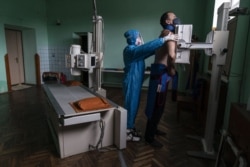A study of the lungs of people who have died from COVID-19 has found persistent and extensive lung damage in most cases.
This finding may help doctors understand what is responsible for a syndrome known as ‘long COVID.’ People with this condition can suffer ongoing health problems for months.
A report on the study appeared in eBioMedicine, a medical journal published by The Lancet.
Scientists leading the research said they found some unusual characteristics of SARS-CoV-2, the virus that causes COVID-19. These qualities may explain why it is able to cause such harm.
One of the co-leaders of the work, Mauro Giacca, serves as a professor at King’s College London. He said the findings seem to show that “COVID-19 is not simply a disease caused by the death of virus-infected cells.”
In some patients, he said, the seriousness of the disease is likely the result of these “cells persisting for long periods inside the lungs.”
Giacca and other researchers studied tissues from the lungs, heart, liver, and kidneys of 41 patients who had COVID-19. They all died at Italy’s University Hospital of Trieste between February and April 2020.
“Massive” damage
Giacca spoke with Reuters news agency about the team’s findings. He said that his research team found no clear signs of viral infection or long-term inflammation in other organs. But they did discover massive damage to the structure of the lungs.
Healthy tissue, he noted, was “almost completely substituted by scar tissue.” Giacca told Reuters that this massive damage could be one of the reasons people are suffering from long COVID.
“Even if someone recovers from COVID,” he added, “the damage that is done could be massive.”
Growing evidence suggests that a small number of COVID-19 survivors can experience some ongoing symptoms. These include extreme tiredness, unclear thinking and shortness of breath. The condition is often called “long COVID.”
Giacca noted that almost 90 percent of the 41 patients he studied had several characteristics unique to COVID-19.
One trait was that patients had extensive blood clotting in passageways transporting blood to and from the lungs. Another was that some lung cells were very large and had many nuclei. This was a result of the combining of different cells into single large cells.
The researchers also found the coronavirus was still present in many kinds of cells.
Giacca said that the existence of infected cells can cause the major structural changes seen in lungs. These changes can last for several weeks or months and might, he added, explain “long COVID.”
I’m Anna Matteo.
Kate Kelland reported this story for Reuters news agency. Anna Matteo adapted it for VOA Learning English. George Grow was the editor.
________________________________________________________________
Words in This Story
persistent - adj. existing for a long time
characteristic - adj. typical of a person, thing, or group : showing the special qualities or traits of a person, thing, or group
inflammation - n. a condition in which a part of your body becomes red, swollen, and painful
scar - n. a mark left on the skin after a wound heals
symptom - n. a change in the body or mind which indicates that a disease is present
unique - adj. belonging to or connected with only one particular thing, place, or person
blood clot - n. a thick and sticky clump of dried blood that stops blood from flowing through a blood vessel in a person or an animal
nuclei - n. biology : the central part of most cells that contains genetic material and is enclosed in a membrane






